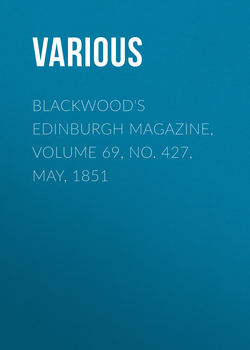Blackwood's Edinburgh Magazine, Volume 69, No. 427, May, 1851

Реклама. ООО «ЛитРес», ИНН: 7719571260.
Оглавление
Various. Blackwood's Edinburgh Magazine, Volume 69, No. 427, May, 1851
SOME AMERICAN POETS.1
THE OLD CLOCK ON THE STAIRS
THE PRAIRIES
THE LAPSE OF TIME
THE CHANGELING
THE MUSIC-GRINDERS
THE TREADMILL SONG
MY NOVEL; OR, VARIETIES IN ENGLISH LIFE
BOOK V. – INITIAL CHAPTER
CHAPTER II
CHAPTER III
CHAPTER IV
CHAPTER V
CHAPTER VI
TRANSATLANTIC TOURISTS.3
ONWARD TENDENCIES
THE PAPAL AGGRESSION BILL
THE BOOK OF THE FARM.8
AN EVENING WALK
MODERN STATE TRIALS.10
THE DINNER TO LORD STANLEY
Отрывок из книги
It is probable that there has been written much excellent poetry on the other side of the Atlantic with which we are unacquainted, which perhaps has never crossed the water at all. We should therefore be very unwise if we professed to give here, even if such a plan could be executed within the compass of a few pages, a general review of American poetry. All that we propose is, to make some critical observations on the writers before us, accompanied by such extracts as shall not unworthily occupy the attention of our readers. Even the list of names which we have set down at the head of this paper is the result more of accident than design: the works of these authors lay upon our table. The two first names will be recognised directly as the fittest representatives of American poetry; they rise immediately to the lips of every one who speaks upon the subject. The two last will probably be new to our readers, and if so, it will be our pleasant task to introduce them. One name only, familiar to all ears, has been purposely omitted. We have elsewhere spoken, and with no stinted measure of praise, of the writings of Mr Emerson. That writer has found in prose so much better a vehicle of thought than verse has proved to him, (and that even when the thought is of a poetic cast,) that to summon him to receive judgment here amongst the poets, would be only to detract from the commendation we have bestowed upon him.
We say it is not improbable that there is much poetry published in America which does not reach us, because there is much, and of a very meritorious character, published here at home in England, which fails of obtaining any notoriety. Its circulation is more of a private than a public nature, depending perhaps upon the social position of the author, or following, for a short distance, in the wake of a literary reputation obtained by a different species of writing. Not that our critics are reluctant to praise. On the contrary, they might be accused of rendering their praise of no avail by an indiscriminate liberality, if it were not the true history of the matter that a growing indifference of the public to this species of literature led the way to this very diffuse and indiscriminate commendation. If no one reads the book to test his criticism, the critic himself loses his motive for watchfulness and accuracy: he passes judgment with supreme indifference on a matter the world is careless about; and saves himself any further trouble by bestowing on all alike that safe, moderate, diluted eulogy, which always has the appearance of being fair and equitable. Much meritorious poetry may therefore, for aught we know, both in England and America, exist and give pleasure amongst an almost private circle of admirers. And why not sing for a small audience as well as for a great? It is not every Colin that can pipe, that can now expect to draw the whole countryside to listen to him. What if he can please only a quite domestic gathering, his neighbours or his clan? We are not of those who would tell Colin to lay down his pipe: we might whisper in his ear to mind his sheep as well, and not to break his heart, or to disturb his peace, because some sixty persons, and not six thousand, are grateful for his minstrelsy.
.....
"You have married since then, and reformed, I suppose. Tell me, old friend, all about it."
Mr Digby, who by this time had succeeded in restoring some calm to his shattered nerves, now rose, and said in brief sentences, but clear firm tones, —
.....